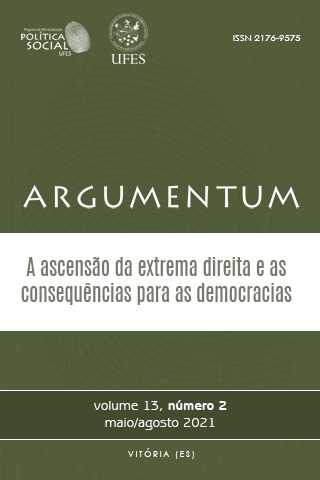Psychiatry Reform and the Espírito Santo Custodial Psychiatric Treatment Unitto
DOI:
https://doi.org/10.47456/argumentum.v13i2.29216Abstract
The article analyzes the connection between Law 10,216/2001 and security measures in the Espírito Santo Custodial Psychiatric Treatment Unit, aiming to question the application of the law in this context. The theoretical framework is composed of critical criminology and is based on an anti-asylum public health perspective. A deductive methodology, bibliographic and documentary analysis, and open questionnaires were utilized. Although there have been efforts towards humanization and training since 2017, severe deficiencies in the state's Psychosocial Care Network were reported as obstacles to justifying the existence of the custodial unit, and as a disrupting factor countering the actions required to release patients from this mode of treatment. The expansion of ambulatory treatment in the state is, therefore, required and the full implementation of the Ordinance nº 94 MS 01/2014.
Downloads
Downloads
Published
How to Cite
Issue
Section
License
Copyright Transfer Agreement
As a condition for submission, the authors must agree with the Copyright Transfer Agreement, by checking the box after reading the clauses.
The author(s) (hereinafter "AUTHOR") hereby agrees to transfer, without any financial compensation, the property of copyrights regarding Argumentum, a journal of the Postgraduate Program in Social Politics (Programa de Pós-graduação em Política Social), Federal University of Espírito Santo (Universidade Federal do Espírito Santo) - Av. Fernando Ferrari, 514 - Goiabeiras 29075-910, Vitória (Brazil), (hereinafter "ARGUMENTUM"), according to the following terms and conditions:
1. I am aware of the terms of "Care Ethics Research Guide" described in the Policies section.
2. AUTHOR warrants to be the writer and copyright holder of the WORK submitted.
3. AUTHOR declares that the WORK does not infringe the rights of third-parties; that the distribution of images (if existent) was authorized; and that AUTHOR assumes total moral and property responsibility for their content.
4. AUTHOR agrees to transfer all the copyrights concerning the WORK to ARGUMENTUM, especially the rights to edit, publish, translate into another language, and reproduce it through any process or technique. ARGUMENTUM becomes the exclusive owner of the rights regarding the WORK, and any total or partial reproduction, in any other medium, printed or electronic, is strictly forbidden without prior written consent by ARGUMENTUM.
5. The copyright transfer is unpaid and, therefore, there will be no monetary compensation whatsoever by ARGUMENTUM in order to use the TEXT.

